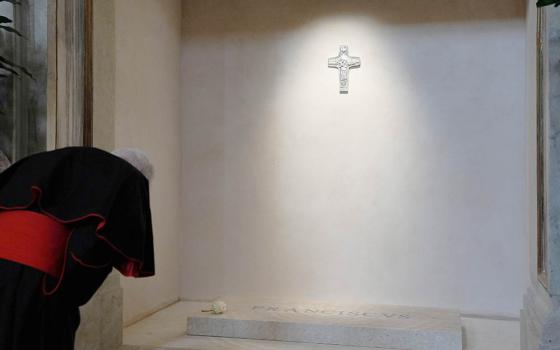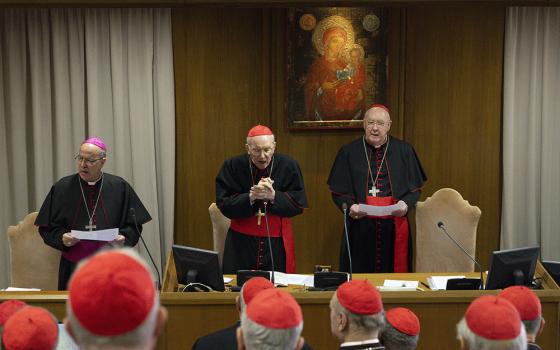
A Kairos Mission Circle meeting of Sisters, Servants of the Immaculate Heart of Mary members held on Zoom June 6, including at least five IHM Associates pictured in this view. (Margaret Susan Thompson screenshot)
What does it mean to live community in a time of social distancing? How does togetherness happen in a context of physical isolation? The Sisters, Servants of the Immaculate Heart of Mary (IHM) of Monroe, Michigan, founded in 1845 and on track this summer to celebrate their 175th anniversary, provide some creative answers to these questions for me.
From the perspective of someone who is an IHM associate, I admire how they integrate the needs and experiences of vowed members in active ministry, retired sisters and associates into a plan grounded by prayer and intentionality — a plan aimed explicitly to strengthen their determination to be what they call "One Community."
As an IHM associate and an active member of a "Mission Circle" (a small group consisting of vowed and associate members), I have watched them with interest since mid-March, when protocols resulting from COVID-19 began to alter so much human interaction in the U.S. and around the world. The IHMs have taken several steps to help their members interact and thrive under such unusual circumstances. I expect that many other congregations have done the same, but I wanted to share my observations.
"The theme of connection has been present and the main focus of our intention," said Sr. Mary Jane Herb, president of the Monroe IHMs, in explaining the goals of the community's leadership team in initiating and modifying a range of activities. One of the most successful has been weekly "check-ins" over Zoom, open to all vowed and associate members living outside the motherhouse. Beginning with prayer, these gatherings — attracting between 25 and 40 members — are then arranged into random breakout groups of five or six, where participants chat for about 40 minutes.
Advertisement
Sr. Jean Morsch said that she really appreciated these gatherings: "We connected with one another by just showing up and sharing our stories. Just 'being human' together, with no agenda." Associate B.J. Schlachter enthused, "' Zooming in' connects me with a 'field of Love energy' called the IHM community. ... I leave each session knowing I was loved and heard."
And Sr. Sue Rakoczy, who connects in from South Africa, where she has been a professor of theology for decades, declares: "There is psychological distance between my life here during the pandemic and what others in the community are experiencing. The Chats bridged these divides."
Rakoczy also said: "The irony and gift of 'sheltering in place/staying at home' while COVID 19 ravages the world is that never before have I/we/the world needed each other so profoundly and felt the importance of relationships with family, friends, colleagues."
Even as the strictest rules of distancing are beginning to be modified, these informal gatherings have been so successful that, at the last scheduled session in late May, all participants urged that they be continued into the foreseeable future as monthly events. Today, they continue, but not as frequently.
Another connection that the community has initiated is a buddy system between sisters who live in the senior living community at the motherhouse and vowed and associate members living elsewhere. These partnerships, often between individuals who did not know each other well or at all prior to being paired, have proven especially delightful, bringing people together through prayer, chats, emails and "snail mail." I've loved getting to know my buddy, Sr. Lorraine ("Honey") Humphrey, through phone calls every few days. And others in the community have expressed similar gratitude for this particular form of bonding.
The sisters "at home" in the senior living community have been largely confined to their rooms through much of the spring, but they have appreciated daily visits from members of the Leadership Team, one of whom stands at each door and checks in to make sure that all is well. Sr. Marie Clark, who is celebrating her 75th Jubilee this year, says that the two words that come to mind as she reflects on the care of the community are "peaceful" and "caring." She appreciates the kindness of those who bring meals to the sisters, as well as the livestreamed prayers and Liturgy of the Word that have been welcomed not only by those in Monroe but also by sisters and associates wherever they might be.
Clark (who is one of the camera operators during livestreamed liturgies) spoke about the value of technology at times like this, noting that every day a variety of events are provided over television and computer — from exercise to music to lectures to classic movies. She spoke of a singalong in her residence wing, during which 22 sisters sat in the doorways of their rooms and joined in the music. She, like many others, has also been able to stay in touch with family and friends through phone, Zoom, email, and FaceTime. And she notes gratefully that none of the sisters who live "at home" in the motherhouse have contracted the corona virus.
This summer was to be the occasion for the congregation to celebrate the 175th anniversary of its founding. Members of their "cousin" IHM communities in Immaculata and Scranton, Pennsylvania, as well as women from Baltimore's Oblate Sisters of Providence, where IHM founder Theresa Maxis Duchemin and co-founder Ann Constance Scharf originally entered religious life, were also going to be in attendance. While that gathering will not be possible, four Self-Organizing Groups, or SOGs, were arranged to explore the IHM's early history, enabling many members to reflect upon not only the community's heritage, but also its path into the future.
Barbara Bacci-Yugovich, co-facilitator of IHM Associates, spoke for many when she reflected: "Our appreciation for one another and our desire to build one community from my perspective has not lost a beat!" She values both Zoom gatherings and individual contacts with members as ways of maintaining connections and bolstering spirits. Her co-facilitator, Sr. Anne Crimmins, agrees, and makes a special point of acknowledging the presence of associates in each dimension of what the IHMs are doing to stay connected in a time of pandemic. "The associates are part of the community," she declares unequivocally. "They are very present in all the ways the community is offering to stay in touch during this time when more traditional ways of connecting are not feasible."
The IHMs have pledged to understand themselves as "One Community" by means of concrete action and not just lip service. This means that all members — vowed and associate, older or not-so-old, in Michigan or halfway around the country or the world — are acknowledged and celebrated as integral parts and participants in community life. In some unexpected but very real ways, such a sense of belonging has unquestionably been strengthened in this time of apparent isolation. In this way, all IHMs give witness to the fact that a time of physical distancing can also be one of social and spiritual communion. While everyone is looking forward to no longer being apart, members have come to appreciate new ways of living out communal commitment even in the face of challenges they could never have anticipated.
[Margaret Susan Thompson is an IHM Associate and a professor of history at Syracuse University.]







